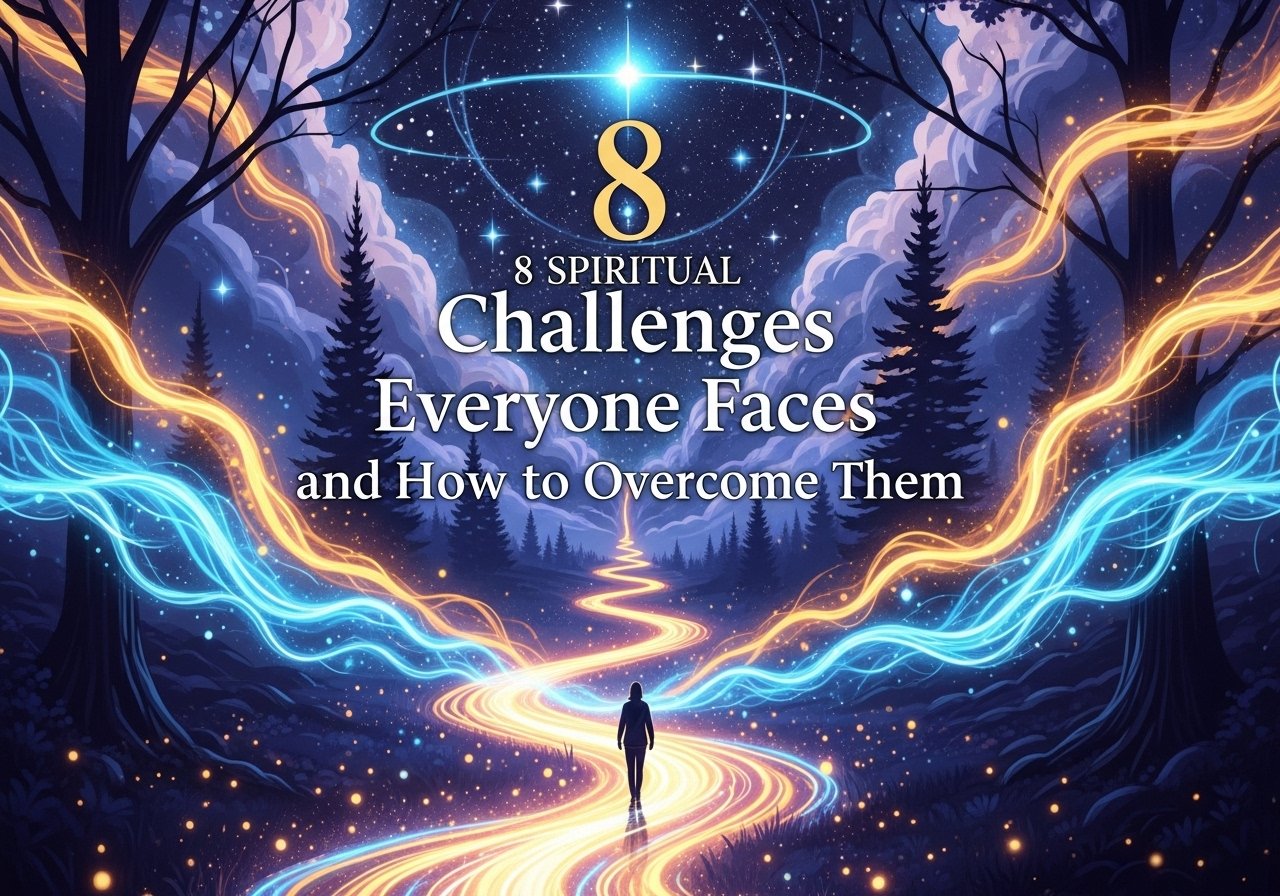Introduction
The path of spirituality is often seen as a journey toward peace, wisdom, and inner harmony. However, what many people don’t realize is that spirituality also comes with its own set of struggles. These struggles are not signs of weakness; rather, they are stepping stones that push us toward deeper growth and transformation. Just as physical exercise strengthens the body, spiritual challenges strengthen the soul.
In this article, we’ll explore 8 common spiritual challenges most people face, why they occur, and how to overcome them with awareness and practice.
The Struggle of Self-Doubt
One of the most common spiritual challenges is doubting oneself and questioning the authenticity of your experiences. Many wonder: Am I truly on the right path? Or am I imagining it all?

Why it happens:
Self-doubt emerges because the spiritual path often requires us to move beyond logic and rationality into intuition and faith—something not everyone is used to.
How to overcome it:
- Keep a journal of your spiritual experiences.
- Surround yourself with uplifting books and teachers.
- Practice daily affirmations to build trust in your inner wisdom.
Balancing Spirituality and Daily Life
A lot of seekers feel torn between their spiritual practices (like meditation, prayer, or yoga) and their everyday responsibilities (work, family, and social obligations).

Why it happens:
Modern life is busy, and we are constantly pulled in multiple directions. This makes it challenging to dedicate time to spiritual growth.
How to overcome it:
- Integrate small practices into daily routines (mindful breathing while commuting, gratitude before meals).
- Set realistic goals instead of long hours of practice.
- Remember: living mindfully is as spiritual as meditation.
The Fear of Letting Go
Spiritual growth often requires letting go—of old habits, toxic relationships, or limiting beliefs. Yet, letting go is easier said than done.
Why it happens:
The human mind clings to familiarity, even if it causes pain, because change feels uncertain.

How to overcome it:
- Focus on what you gain, not what you lose.
- Use guided meditations on release and surrender.
- Remind yourself that growth requires space for the new to enter.
The Challenge of Loneliness
As one evolves spiritually, it’s common to feel misunderstood by friends or family. This can create feelings of isolation and loneliness.
Why it happens:
Not everyone in your circle may share the same level of awareness, and your values may begin to shift.

How to overcome it:
- Join spiritual communities online or locally.
- Engage in group meditations or workshops.
- Accept that solitude can also be a teacher, offering clarity and strength.
Dealing with Ego and Pride
Ironically, spiritual growth can sometimes inflate the ego. People may begin to feel superior because of their awareness or practices, creating spiritual pride.
Why it happens:
The ego cleverly disguises itself, even within spirituality, leading us to believe we are more “enlightened” than others.

How to overcome it:
- Practice humility by serving others.
- Remind yourself that spirituality is about unity, not separation.
- Stay open to learning from everyone, regardless of their stage of growth.
Doubts About Faith and the Universe
Sometimes, despite practicing, we feel disconnected from the divine or question whether higher powers truly exist.
Why it happens:
Periods of spiritual dryness or silence are part of the natural cycle of growth, much like winter precedes spring.

How to overcome it:
- Practice patience and understand that silence is not absence.
- Reflect on past experiences of divine connection.
- Read spiritual texts or biographies of seekers who went through the same.
The Pull of Materialism
In a world filled with advertisements, status symbols, and social comparisons, detaching from material desires is incredibly hard.
Why it happens:
Society often measures success through possessions and achievements, creating internal conflict for seekers who yearn for simplicity.

How to overcome it:
Practice gratitude for what you already have.
Simplify your lifestyle gradually instead of forcefully.
Focus on experiences and relationships rather than material gain.
The Challenge of Consistency
Many people start their spiritual journey with enthusiasm but soon struggle to stay consistent with practices like meditation, prayer, or mindfulness.

Why it happens:
Distractions, lack of motivation, or expecting quick results can cause inconsistency.
How to overcome it:
- Start small: even 5 minutes daily can create impact.
- Set reminders or create a sacred space at home.
- Celebrate progress instead of focusing on perfection.
Conclusion
Facing spiritual challenges is not a setback—it’s proof that you’re evolving. Every obstacle on the path is an invitation to look deeper, grow stronger, and align closer to your higher self. By understanding these struggles and learning how to navigate them, you transform challenges into stepping stones toward spiritual awakening.
Remember, spirituality is not about perfection—it’s about persistence.
Frequently Asked Questions
Q1. Why do spiritual challenges occur in the first place?
Spiritual challenges occur because growth requires transformation, and transformation is rarely comfortable. These obstacles—whether self-doubt, ego, or loneliness—push us beyond our comfort zone so we can expand awareness, develop resilience, and strengthen faith.
Q2. How do I know if what I’m experiencing is a spiritual challenge or just normal life stress?
The difference lies in the impact on your inner self. Normal stress usually relates to external pressures like work or finances, while spiritual challenges often spark deeper questions about meaning, purpose, and connection. If your struggle makes you reflect on your soul’s growth or values, it’s likely a spiritual challenge.
Q3. Can spiritual challenges ever be completely avoided?
No, spiritual challenges cannot be avoided. They are part of the journey. In fact, they are necessary for awakening. Instead of avoiding them, focus on understanding their purpose and learning the lessons they carry.
